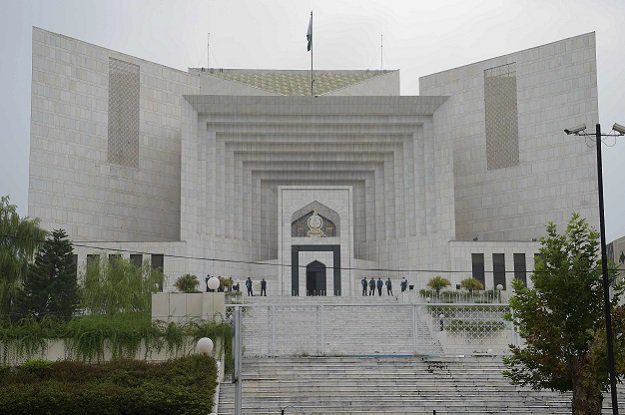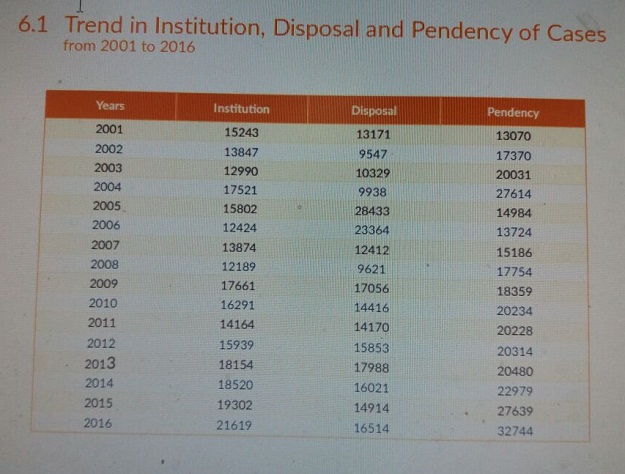
The rate of pendency has risen almost 100% during the last five to seven years. In 2001, the number of cases in the SC backlog was recorded at 13,070 which have since multiplied several times, reaching its current figure.
Moreover, historical trends suggest that the number has increased each year since 2001 as 17,370 cases were pending in 2002. From 2003 to 2016, ratio of pendency was recorded as 20,031, 27,614, 14,984, 13,724, 15,186, 17,754, 18,359, 20,234, 20,228, 20,314, 20,480, 22,979, 27,639 and 32,744. It is pertinent to mention here that there was a noticeable increase in pendency in 2016 as compared to the previous trends.
Recently, the Supreme Court released its annual report 2016-17, wherein it is stated that the trend of increase in the institution of cases and consequential piling up of backlogs continued. The report says that the huge pendency coupled with a high rate of institution did not escape the attention of the chief justice and the judges and the matter was deliberated in full court meetings from time to time.

The factors leading to the higher institution as well as causes of delays in the disposal of cases were considered in depth. It was observed that the rise in the institution of cases was mainly on account of higher rate of disposal of cases in the high courts. Thus, it was resolved that strategies would be evolved to deal with the heavy backlogs.
Ensure security of those facing genuine threats: CJP
Moreover, the report adds that on June 1, 2016, the pendency of the cases in the SC stood at 29,665, and after exactly a year about 20,237 new cases were filed. During the same period, some 14,999 cases were decided, increasing the overall pendency to 34,903.
According to the annual report, the SC is fully conscious of the sufferings of the litigant public, the problems of lawyers and pressures on the current human resource (Judges and staff included), is all set to play its constitutional role in the governance system of the country in general, and in the dispensation of justice in particular.
The document further reveals institution rate is increasing every year and the number of cases instituted in each year from 2001 to 2016.
In 2001, 15243 cases were filed in the apex court. Later 13,847, 12,990, 17,521, 15,802, 12,424, 13,874, 12,189, 17,661, 16,291, 14,164, 15,939, 18,154, 18,520, 19,302 and 21,619 cases were instituted in each year from 2002 to 2016.
Reducing pendency
During the 8th Judicial Conference on May 5, Acting Chief Justice Asif Saeed Khosa said that there is need to consider the ‘bar of finality’ about adjudication on facts and only points of law should be brought before the superior courts.
The conference also discussed strategies for delay reduction and expeditious disposal of backlog cases. It was recommended for reducing adjudication tier that instead of a four-tier system, a three-tier system should be introduced, having trial, appeal and constitutional stages, where purely legal issues would be adjudicated.
Likewise, the declaration also proposed that adjournments on frivolous grounds to be curbed. Unnecessary adjournments sought by counsel should be discouraged. Adjournments should only be allowed in exceptional circumstances. There is, furthermore, a dire need for reduction of strikes in the courts. It was also suggested to introduce a case management system in order to keep track of cases which in turn will help in reducing the backlog by the speedy disposal of cases.
Moreover, it was also proposed to strictly follow statutory provisions for curbing delays and discouraging unnecessary applications. In order to follow the suggestion, judges must actively avail the powers granted to them under various laws. For example, the maximum duration of stay orders, or the submission of documents within a given time period, must be strictly followed.
Another important suggestion that was discussed during the conference was to increase the number of judges and courts which could be a big boost in speedy disposition of cases while it was also advised to increase cooperation between bar and bench.
Human Rights Cell
Meanwhile, the SC’s annual report stated that human dignity is inviolable and it can only be safeguarded through preservation of human rights. “These rights are correlated, having universal application without any discrimination. Respect and equality of inhabitants require an even playing field for future accomplishments and sustainable development of a nation-state”, it read.
”Though human rights have been enshrined in all our constitutions since independence, the record of their maintenance is rather dismal, the oppressive colonial legacy of institutional arbitrariness is still rampant and usually creates obstructions in the implementation process. The position has never been impressive due to the apathetic approach of successive governments. Different interest groups with political leverage are exploiting the downtrodden and weak segments of society. Judicial apparatus is relentlessly working for bringing betterment in the abysmal record of human rights. However, centuries-old socio-psychological norms and habits of exploitations, cruelties and oppression of women, children and poverty-stricken classes have persistently been defying all such endeavours. With such dark record of human rights violations, our country would never be given due respect as an equal member of the club of civilised nations if such circumstances persist, a nation remains weak, underdeveloped and vulnerable. The magnitude of this crisis requires a coherent approach and determined effort to curb human rights violations in any form. Injustices and bad governance by state functionaries and exploitation of masses by different interest groups have made the courts assume a proactive role. Public interest litigation and judicial activism are now prominent features of our judicial system, to fill this vacuum naturally”, says the report.
Similarly, the report also adds that the CJP himself supervises the Supreme Court Human Rights Cell where 2,500 to 3,000 applications are received every month.
These applications are mostly related to despotism by law enforcement authorities, honour killings and such threats, corruption, inefficiency and nepotism by public functionaries, administrative inaction and slackness, environmental pollution and scarcity of clean water, aggression against women and children and weaker segments of society, minorities issues. However, it is learnt that ratio of filing applications in the HR cell has also been increased almost three to five times in the last couple of months.
On June 1, 2016, pendency of cases in the HRC stood at 9,903. During the reported period, 29,432 new applications were received, while 28,781 were disposed, raising overall pendency to 10,554 till May 2017, according to the annual report.

















COMMENTS
Comments are moderated and generally will be posted if they are on-topic and not abusive.
For more information, please see our Comments FAQ